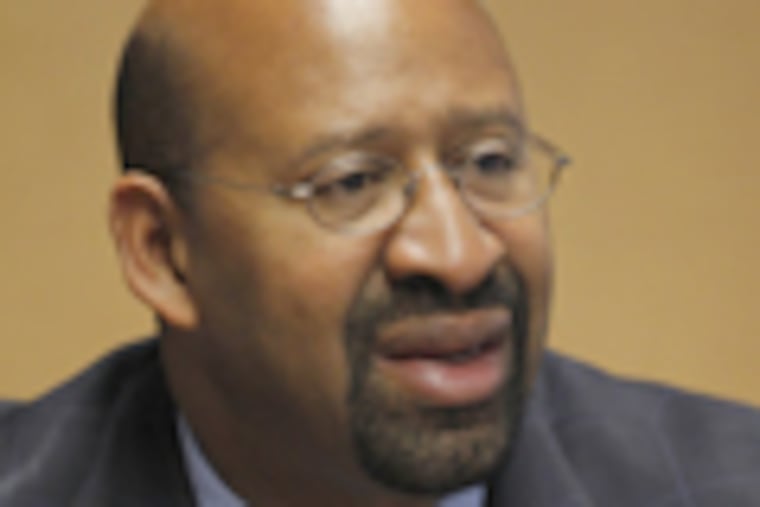Council votes to keep DROP, but with some tweaks
HATE DROP? City Council doesn't care. Despite months of criticism and a call from Mayor Nutter to kill the Deferred Retirement Option Plan, Council yesterday gave preliminary approval to keep DROP, but at a reduced cost. Police and firefighters would be exempted from some changes.

HATE DROP? City Council doesn't care.
Despite months of criticism and a call from Mayor Nutter to kill the Deferred Retirement Option Plan, Council yesterday gave preliminary approval to keep DROP, but at a reduced cost. Police and firefighters would be exempted from some changes.
The final tally at the committee-level vote was 15-2 in favor of the plan. Only Councilman Jim Kenney and Councilwoman Jannie Blackwell opposed the bill, Kenney because he wants to end DROP and Blackwell because she didn't want to favor uniformed workers over nonuniformed.
Nutter, who had sent Council legislation to kill DROP, declined to say whether he would veto the bill if it receives final passage, which could come as soon as next Thursday.
"I'm very, very disappointed," Nutter said. "We cannot afford this program. Even [with] the amended bill, today Council's own consultant indicated that this program would cost the city money."
Established in 1999, DROP allows city workers to set a retirement date up to four years in the future, at which point their pension benefit is frozen and they start accruing payments in an interest-bearing account while still on the payroll. When the employees retire, they collect a lump sum and start receiving pension payments.
DROP has drawn public ire because elected officials have enrolled - including some who signed up, ran for re-election and "retired" for a day to collect a payout before returning to serve. Seven Council members are current or past DROP enrollees. Five chose not to run again, and Councilman Frank Rizzo lost his re-election bid, leaving Councilwoman Marian Tasco as the only one planning to take DROP and return in 2012.
Cost estimates of DROP vary. A Boston College study commissioned by Nutter reported last year that DROP had cost the city $258 million since 1999. A later review by Council's consultant put the cost at $100 million.
Under the plan Council approved yesterday, employees would not be able to enter DROP until two years after they hit retirement age - which varies by job. And the interest rate, now set at 4.5 percent, would be adjusted based on U.S. Treasury rates. Also, employees could collect a lump sum upon retirement only in exchange for lower pension payments.
Anyone currently eligible for DROP would be grandfathered in and allowed to enter the original DROP at any time. And police and firefighters would be exempt from the two-year delay to enter the program - a move that angered nonuniform unions.
AFSCME District Council 33 President Pete Matthews said he expected to take legal action on the grounds that DROP changes must be bargained. He also slammed Council for not treating all city workers the same, asking: "How can you differentiate one group from another?"
Meanwhile, local firefighters' union President Bill Gault said he expected to challenge the interest-rate changes that would hit his members.
"I don't think they can change it without bargaining," Gault said.
Local Fraternal Order of Police President John McNesby said that he was thankful Council made changes for police and that he'd wait on any further moves. During the hearing, he pushed for DROP to remain in place for police, arguing that it was a bargained right and that officers are not speeding up retirements and costing the city money.
"For both the officer and the Philadelphia Police Department, the DROP program is working exactly as you intended," McNesby said.
Council's actuarial consultant, Thomas Lowman, of Baltimore-based Bolton Partners, testified that Council's proposed changes would help reduce, though not eliminate, costs.
"The proposed changes are unlikely to eliminate all of the cost of the DROP provision, however they go a material way in that direction," said Lowman.
Throughout the hearing, Council asked virtually no questions as more than a dozen union leaders, city officials and activists spoke.
City Finance Director Rob Dubow testified in favor of killing DROP, saying it was too expensive given the city's weak pension fund, which has only 47 percent of the assets needed to pay projected benefits.
"A system as poorly funded as the city's simply cannot afford the extra burden of a DROP - even one with the likely reduced price tag created by [Council's bill]," Dubow said.
Committee of Seventy President Zack Stalberg drew boos from city workers when he called on Council to end DROP.
"The public hates the DROP program. It has become the symbol for arrogance and entitlement," said Stalberg.